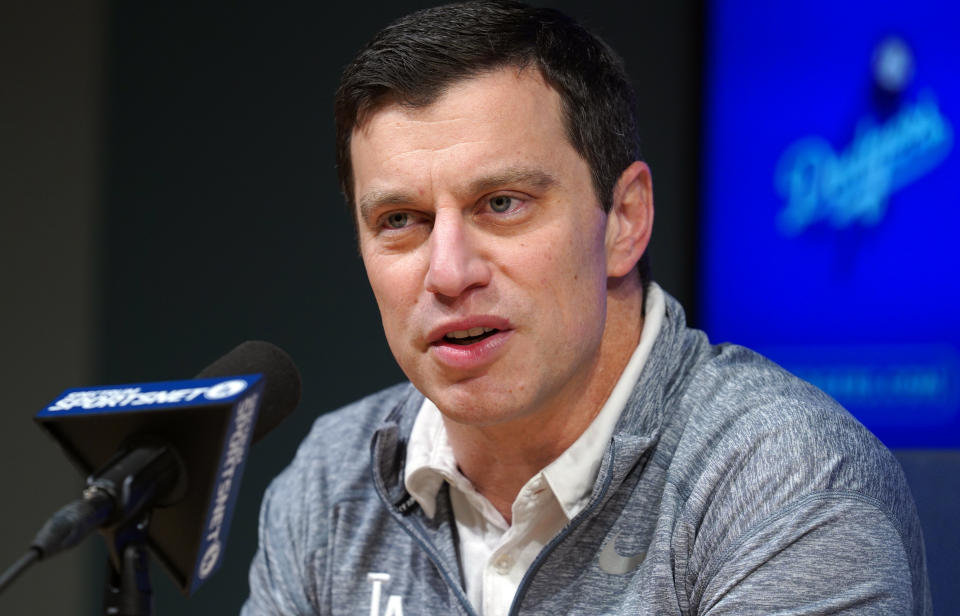How the Mookie Betts blockbuster could define the executives who concocted it

The thing about talent in ballplayers is it sometimes gets homesick. Or breaks. Sometimes it’s not having any fun anymore. Sometimes it hates the manager. So it pouts. Or the hitting coach. So it pouts more. Sometimes it drinks too much. Sometimes the three hours when it must be present is prioritized behind the 21 hours it doesn’t want to be, and so talent leaks away. It always grows old and slow and, then, maybe, a little defensive, and there’s not much to be done about that. Not since testing.
Talent is a glorious, moody little beast that wins games and saves jobs and makes money and downs a Bud Light on a parade float and permits us to feel better about ourselves if that’s necessary too. Unless it doesn’t. And then the opposite of all that happens, including downing a Bud Light under a parade float, which is worse.
So, on the morning after the Los Angeles Dodgers traded for, and the Boston Red Sox traded away, Mookie Betts, it seemed natural to think of the men who decide what talent is and how long it will last and what it is worth and whether they make those decisions and then sob for two hours or retch for two hours.
As outlined, Betts and David Price and about half of Price’s salary were traded to Los Angeles in a three-way deal that ended with outfielder Alex Verdugo and right-hander Brusdar Graterol in Boston. The Minnesota Twins, for supplying the Graterol portion of the trade, landed starter Kenta Maeda.
The protagonists were Andrew Friedman, a general manager-type for 15 years, first in Tampa and then in L.A., and Chaim Bloom, who began his career in earnest as an intern somewhere on Friedman’s staff in Tampa and 3½ months ago became the general manager-type in Boston. They maintain identical missions — win baseball games, because of talent — and yet it is timing that brought them together again, 5½ years after Friedman left Tampa and mere moments after Bloom began the heavy work of healing the Red Sox long-term.
Near the end of weeks of parrying, during which one Red Sox employee mused with a grin that he hoped the elder Friedman was not engaging in Jedi mind tricks with his former mentee, Bloom took the Dodger proposal to team owners and hours later the deal was done. The Dodgers had paid plenty for a season of Betts, if that is what it will be, and three years of Price at a discount. And Bloom, in his first significant act in Boston, before even replacing the beloved field manager who’d been ensnared in a cheating scandal, had sent off one of the best and most adored players in franchise history. In the name of some payroll technicality. Which, of course, devoted fans love to hear about. Soon as they finish up their $8.50 beers.
That’s a day.
Friedman, who in L.A. had never done anything but win National League West titles (and twice went to the World Series), was hailed for finally getting it right, proving again that talent is perhaps the second-most fickle element in the building. The first being that everyone else is at least a little crazy and never, ever happy. Also, they believe — no, know — they can do your job better than you can.
That said, he’s unlikely to ever trade for a better player than Mookie Betts, and certainly not in a deal in which he is perceived to have won going away, a perception that will float along on the whims of batting averages and October baseball. This is not a small moment in his career. And this is the thing about talent, as almost none of the moments are small, because sometimes talent is exactly what it looks like. And sometimes talent is a glass door you were sure was open and instead breaks your glasses and your nose.
While Friedman now lives in a world of a Mookie Betts trade with a David Price on the side — that world endeavoring to remain beneath a $208-million ceiling — remember he once lived where a $70-million payroll meant trading away Price. Twelve years ago, on a $24-million payroll, he traded Delmon Young and two others to Minnesota for Matt Garza and Jason Bartlett. The payroll nearly doubled and the Rays went to the World Series. Then, three years later, he traded Garza to the Chicago Cubs for, among others, Chris Archer and Sam Fuld. One year he traded away James Shields and Wade Davis and went back to the playoffs.
So, for every splashy Yu Darvish trade, Manny Machado trade, Yasmani Grandal trade, Mookie Betts trade in L.A., somewhere back there is a trade that felt a little less like a finishing touch and a little more like survival. And it is all so fragile. Just ask Chaim Bloom, whose first assignment in Boston — to trade a very talented player or two — looks a lot like every assignment he had in Tampa, where no opening day payroll had ever touched $80 million. Where that leaves him is hoping that Alex Verdugo and Brusdar Graterol, who together have 443 big-league at-bats and 9⅔ big-league innings pitched, and who both have extreme talent, well, in a way, stay talented.
When you’re in the accumulation of talent game, and sadly not everyone always is, all of the scouting reports and all of the optimism one day end up in a batter’s box and that’s where you’d have to leave it. The game’s a buzzsaw. What happens, happens. It could be great. It might not be.
And, in between, it could get homesick.
More from Yahoo Sports:

 Yahoo Finance
Yahoo Finance 
